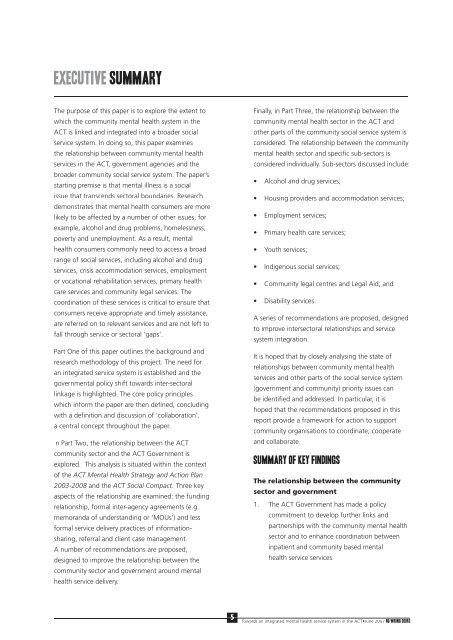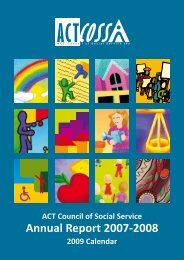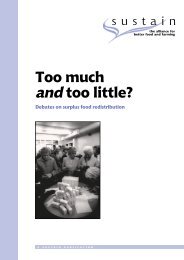actcoss text final.indd - ACT Council of Social Service
actcoss text final.indd - ACT Council of Social Service
actcoss text final.indd - ACT Council of Social Service
You also want an ePaper? Increase the reach of your titles
YUMPU automatically turns print PDFs into web optimized ePapers that Google loves.
executive summary<br />
The purpose <strong>of</strong> this paper is to explore the extent to<br />
which the community mental health system in the<br />
<strong>ACT</strong> is linked and integrated into a broader social<br />
service system. In doing so, this paper examines<br />
the relationship between community mental health<br />
services in the <strong>ACT</strong>, government agencies and the<br />
broader community social service system. The paper’s<br />
starting premise is that mental illness is a social<br />
issue that transcends sectoral boundaries. Research<br />
demonstrates that mental health consumers are more<br />
likely to be affected by a number <strong>of</strong> other issues, for<br />
example, alcohol and drug problems, homelessness,<br />
poverty and unemployment. As a result, mental<br />
health consumers commonly need to access a broad<br />
range <strong>of</strong> social services, including alcohol and drug<br />
services, crisis accommodation services, employment<br />
or vocational rehabilitation services, primary health<br />
care services and community legal services. The<br />
coordination <strong>of</strong> these services is critical to ensure that<br />
consumers receive appropriate and timely assistance,<br />
are referred on to relevant services and are not left to<br />
fall through service or sectoral ‘gaps’.<br />
Part One <strong>of</strong> this paper outlines the background and<br />
research methodology <strong>of</strong> this project. The need for<br />
an integrated service system is established and the<br />
governmental policy shift towards inter-sectoral<br />
linkage is highlighted. The core policy principles<br />
which inform the paper are then defined, concluding<br />
with a definition and discussion <strong>of</strong> ‘collaboration’,<br />
a central concept throughout the paper.<br />
In Part Two, the relationship between the <strong>ACT</strong><br />
community sector and the <strong>ACT</strong> Government is<br />
explored. This analysis is situated within the con<strong>text</strong><br />
<strong>of</strong> the <strong>ACT</strong> Mental Health Strategy and Action Plan<br />
2003-2008 and the <strong>ACT</strong> <strong>Social</strong> Compact. Three key<br />
aspects <strong>of</strong> the relationship are examined: the funding<br />
relationship, formal inter-agency agreements (e.g.<br />
memoranda <strong>of</strong> understanding or ‘MOUs’) and less<br />
formal service delivery practices <strong>of</strong> informationsharing,<br />
referral and client case management.<br />
A number <strong>of</strong> recommendations are proposed,<br />
designed to improve the relationship between the<br />
community sector and government around mental<br />
health service delivery.<br />
Finally, in Part Three, the relationship between the<br />
community mental health sector in the <strong>ACT</strong> and<br />
other parts <strong>of</strong> the community social service system is<br />
considered. The relationship between the community<br />
mental health sector and specific sub-sectors is<br />
considered individually. Sub-sectors discussed include:<br />
• Alcohol and drug services;<br />
• Housing providers and accommodation services;<br />
• Employment services;<br />
• Primary health care services;<br />
• Youth services;<br />
• Indigenous social services;<br />
• Community legal centres and Legal Aid; and<br />
• Disability services.<br />
A series <strong>of</strong> recommendations are proposed, designed<br />
to improve intersectoral relationships and service<br />
system integration.<br />
It is hoped that by closely analysing the state <strong>of</strong><br />
relationships between community mental health<br />
services and other parts <strong>of</strong> the social service system<br />
(government and community) priority issues can<br />
be identified and addressed. In particular, it is<br />
hoped that the recommendations proposed in this<br />
report provide a framework for action to support<br />
community organisations to coordinate, cooperate<br />
and collaborate.<br />
SUMMARY OF KEY FINDINGS<br />
The relationship between the community<br />
sector and government<br />
1. The <strong>ACT</strong> Government has made a policy<br />
commitment to develop further links and<br />
partnerships with the community mental health<br />
sector and to enhance coordination between<br />
inpatient and community based mental<br />
health service services.<br />
5 Towards an integrated mental health service system in the <strong>ACT</strong>•June 2007 NO WRONG DOORS













